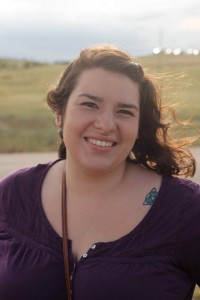My name is Autumn White Eyes and I member of the Oglala Lakota Tribe (Sioux). I am also Northern Cheyenne, Turtle Mountain Band of Ojibwe (Chippewa), Pawnee, Mexican, French, and German. I am a member of the class of 2014 at Dartmouth College, and I am a Native American Studies and English Double Major. Interviewing Eduardo for my Oral History project has been one of the most rewarding projects I have ever done at Dartmouth.
I highly value the art of Oral Histories. To me, the importance of oral history is the passing down of history through story telling and songs. Oral history is something that has always been emphasized in my life and I grew up learning that the history of my people as it was passed down by word of mouth. I chose to take this course because I would be able to do a project like this one. I have taken a Native American Studies class called Native American Lives, in which there was an Oral history project that was similar to this one, but was not as large as making a WordPress site. For that class I interviewed my best friend, and I learned so much about her and from her. Thus I knew that these Oral history projects are very important for learning new and important ways of shaping our thinking.
I also wanted to know more about the topic of migration as I did not know much about it prior to being in this class. Additionally, I’ve always heard people say ignorant things such as, “Mexicans take all the jobs,” without really knowing the struggle of Mexican people or other Latin Americans. In my household my family has always said that if Native Americans could chose there would not be a border because the Americas once belonged to Indigenous people, as we were the first people here, including Latin Americans with indigenous roots, so we should all have the right to move between lands freely. My family has always taught me I should always be welcoming to Mexicans and other migrants because many are Indigenous and I am also part Mexican.
Hearing Eduardo tell his story gave me insight to a story that I knew nothing about. I had no idea what his experiences entail or what it must feel like to not return to your home for 11 years. My land and my home are the most important places in my life, but I understand that his mother left so that she could provide more for her children. There are parts of his story that I can relate to and other parts that I could never understand his struggle, especially with learning English. I come from a place that despises English, because my grandparents and other elders were forced to learn it in the Boarding school era. Many Native Americans are desperately trying to learn their languages and keep them alive.
Other things that I learned and felt that were important for me to hear about the way in which Eduardo’s mother sent remittances home to Mexico so that Eduardo and his older sister could come to the U.S. This was similar to other transnational connections that we talked about during this course and it was important for me to see the way in which it affects someone’s life that personally know. I also liked hearing about Eduardo applying for college. I could relate to his experience of seeking an outside program for help. I also thought his experience was unique in trying to find schools that would provide financial aid and accept him. I felt that this part of Eduardo’s story was important because we haven’t heard many stories about the way in which undocumented migrants get into college in the U.S. I think it was important for me to hear Eduardo’s story, which was filled with his motivation and centered on his family values. I am really glad I had the opportunity to interview Eduardo because I feel as though I learned a lot from his story, and was able to see a lot of the concepts that we learned in class as they apply to the experiences of a person that I personally know.
References
- Journey, Origins. Mexican/American Flags. 2010. Photograph. Flickr. Yahoo. Web. <http://www.flickr.com/photos/48385736@N02/4594647946>.
- Martin, Sarah Celeste. East Los Angeles. 2011. Photograph. Los Angeles. Flickr. Yahoo. Web. <http://www.flickr.com/photos/30130971@N06/6141165583/>.
- McCarter, Alexander. Rural but Beauty. 2011. Photograph. Mexico. Flickr. Yahoo. Web. <http://www.flickr.com/photos/57939378@N05/5606698315>.
- Schreckengost, Pamela. Sunset at Pine Ridge Rez. 2011. Photograph. Pine Ridge Indian Reservation. Flickr. Yahoo. Web. <http://www.flickr.com/photos/pamelainob/6290121927>.
- “Soy Latino” Dir. Eddie Zapata. Perf. Eduardo Najera. Youtube. 1 June 2012. Web. <http://www.youtube.com/watch?v=hgeCDZcNBEg>.
Other Photographs provided by: Rodrigo Ramirez, Royivia Ferguson, Daniela Hernandez, and Eduardo Najera.


